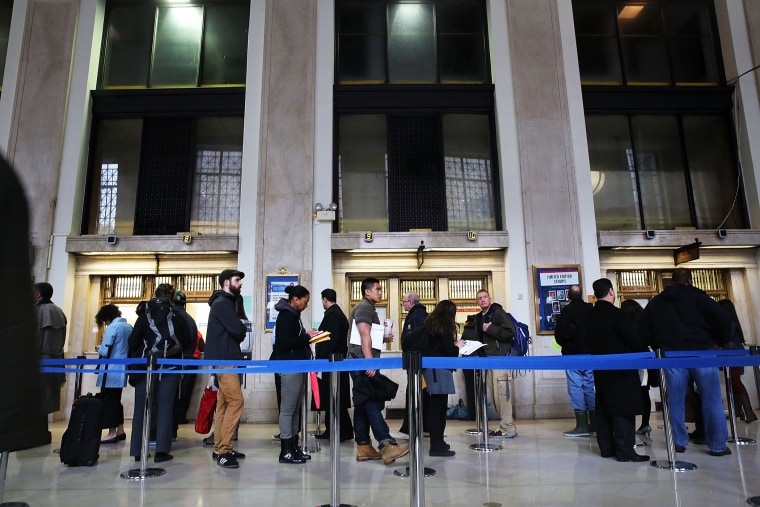It's Tax Day in America, and a majority of Americans want the federal government to use their revenue to contribute to education, according to the latest NBC News Online Survey conducted by SurveyMonkey with the April 15 tax deadline just a week away.
Respondents were asked to choose up to three areas where they would like to direct the federal government to spend their taxes. Education was named as a priority by 51% of Americans, followed by health care at 37% and national defense at 30%. (Note: These numbers do not add up to 100% because respondents could select up to three categories of spending.)
RELATED: Obamas pay $93,362 in federal taxes; tax rate of 20%
Support for education was strongest among younger Americans– nearly two-thirds of those under 45 years old prioritized education, compared to less than half of those between 45 and 59, and fewer than 4 in 10 of those over the age of 60. Among Democrats and independents, education also rose to the top.
About 4 in 10 Americans had health care among their choices – the second highest overall category. And while age didn’t make much of a difference, party identification did: half of Democrats listed health care as a top 3 priority, compared to a third of independents and a quarter of Republicans.
National defense was a higher priority for Republicans than education, with 57% choosing it, compared to 39% who chose education. Those over 45 years old were about 3 times more likely to prioritize national defense than those under 30. Men were 10 points higher than women on national defense.
Here are some other notable differences in spending priorities:
- Twice as many under the age of 30 prioritized natural resources, energy and environment as those over 60; women were 10 points higher on spending on the environment than men.
- About a third of Republicans and independents wanted their tax dollars used to reduce the deficit, compared to just 14 percent of Democrats.
- Support for spending tax dollars on science, space, and technology was highest among those under 30. Those over 60 were the most supportive of spending on immigration,law enforcement, and administration of justice.
Although education ranked highest for Americans overall, education spending comes in 10th place in terms of where actual federal taxpayer dollars go, according to the White House. Health care and national defense are the largest two pieces of the federal budget pie -- nearly matching how Americans say they would appropriate their taxes. However, the third largest source of government spending is the so-called “safety net” programs, such as aid for low-income workers, the unemployed and those with disabilities. That area ranked seventh among Americans’ choices for how their taxes should be spent.
Americans are divided as to whether or not they pay too much in taxes: 48% say they pay too much in taxes, and 47% said they pay their “fair share.” Just 4% say they pay too little in taxes. Party identification plays a role, with a majority of Republicans and independents saying they pay too much and a majority of Democrats saying they pay their fair share.
The NBC News Online Survey was in the field the week before Tax Day; with a week left to file, only about 3 in 10 Americans said they had not yet filed their taxes. Sixty percent said they were already filed, while 20% said they expected to get them done before the 15th. But 1 in 10 Americans were procrastinating as long as possible – 4% said they would get them done on Tax Day itself, and 6 percent said they would apply for an extension.
The NBC News-SurveyMonkey Poll was conducted online April 6-8, 2015 among a national sample of 2,052 adults aged 18 and over. Respondents for this non-probability survey were selected from among those who have volunteered to participate in the SurveyMonkey Audience panel. Results have an error estimate of plus or minus 3.0 percentage points. A full description of our methodology can be found here. The survey was produced by the Analytics Unit of NBC News in conjunction with Penn’s Program on Opinion Research and Election Studies with data collection and tabulation conducted by SurveyMonkey. Analysis by the University of Pennsylvania’s Program on Opinion Research and Election Studies.
